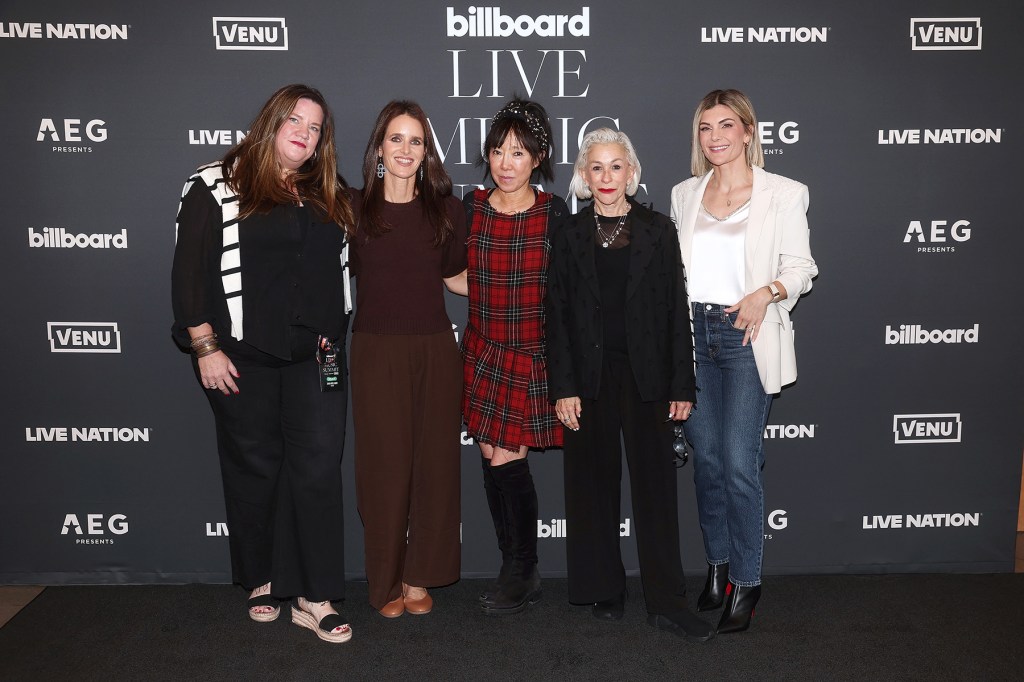Business News
Page: 6
Trending on Billboard
CMT’s flagship show, the Hot 20 Countdown, will conclude at the end of the year, Billboard has learned from sources.
The program, hosted by Cody Alan and Carissa Culinar, has run on CMT since 2013. The show counts down the 20 hottest country music videos and features appearances by country artists.
Related
The Hot 20 Countdown is the last original regular music programming on the channel, which has experienced continual cutbacks in staff and programming over the past year and a half. This spring, for the first time since its debut in 2002, the CMT Awards were paused as parent Paramount Global merged with its new owner, Skydance Media. That deal closed in August.
Though non-music related, CMT does still air original programming, with the Taylor Sheridan-produced The Last Cowboy, a horse-reining rider talent competition. The sixth season premieres on Friday (Nov. 7). Last week, it was announced that Yellowstone creator Sheridan will leave Paramount in 2028 for a new deal with NBCUniversal.
As with the other Paramount-owned linear channels, there has been a massive talent drain at CMT over the past 18 months, including Leslie Fram, senior vp of music strategy and talent, who left last fall, as did director of music and talent Stacy Cato, vp of production; Quinn Brown, vp of production; Ray Sells, senior director of production and Darrell Hughes, senior producer of Hot 20 Countdown, among others.
Related
This fall, there have been more cuts and buyouts, including Donna Duncan, vp of CMT music and talent, who left in September. Last week, as around 1,000 people were cut across Paramount, Margaret Comeaux, the highest-ranking executive still at CMT, who serves as senior vp of production, music & events, announced she will leave the company in December after 24 years. (Comeaux also serves as an executive producer on Hot 20 Countdown.) Melissa Goldberg, who had been CMT’s vp of digital and social, left the company to join sports and entertainment company Teton Ridge in October.
Even before the merger, Paramount Global had been chipping away at original content on CMT and other websites. In June 2024, Paramount stopped producing original content for many of its cable channels’ websites, including CMT.com, which had been a robust site for years, and began directing visitors to content on Paramount+ and other sister outlets.
CMT’s daytime programming consists primarily of classic sitcoms, including Reba, Roseanne, Mama’s Family, King of Queens and Golden Girls, as well as movies like Raiders of the Lost Ark. Music videos run overnight between 12 a.m. and 6 a.m. In addition to new episodes premiering on Saturday mornings, the Hot 20 Countdown repeats on Sunday mornings.
In broader Paramount Skydance news, the company announced today that George Cheeks, chair of TV media, who oversees CBS, will now also oversee the cable networks. Laurel Weir, who reports to Cheeks, will oversee programming for Paramount TV Media, including CMT.
Billboard has reached out to Paramount for comment.
Trending on Billboard
Most rock biopics end with a triumphant performance — a symbolic onstage conquering of demons, whether at Folsom Prison (by Johnny Cash in Walk the Line), Live Aid (Queen, Bohemian Rhapsody) or the 1965 Newport Folk Festival (Dylan, A Complete Unknown). It’s the obvious emotional payoff: Performers are at their best while performing, and the energy of an onscreen audience can raise that of the one in the theatre.
Related
The new Bruce Springsteen film, Springsteen: Deliver Me From Nowhere, doesn’t end like that, though. It ends with Springsteen breaking down in a psychiatrist’s office. And the closest it gets to a concert finale is a “10 months later” epilogue, set backstage after a show, when an adult Springsteen sits on his father’s knee as they begin to come to terms with the fractures in their relationship.
In other words, Deliver Me From Nowhere, which opened Oct. 24, is a very small story about a very big rock star. It takes place in less than a year, at a turning point in Springsteen’s career when he was already playing arenas but before Born in the U.S.A. made him a global superstar. Most of the story unfolds in and around a house Springsteen rented in Colts Neck, New Jersey, and on the surface it’s the story of how he made the downcast, acoustic album Nebraska. But it’s really about a man struggling to come to terms with his past — especially his relationship with his troubled father — in a way that will help him navigate his future. Rolling Stone columnist Rob Sheffield describes the film as “a whole movie of men talking about Bruce Springsteen’s problems, one of whom is Bruce.”
I’m a big Springsteen fan, and I loved the movie. If you’re a fan, it tells the story of an interesting time: Springsteen finished the tour for The River in fall 1981, released an acoustic album that sounded different from anything else he had done a year later, and reemerged in spring 1984 as a buff megastar with what would become one of the best-selling albums of the 1980s. The best source of information about this time is Warren Zanes’ compelling 2023 book Deliver Me From Nowhere: The Making of Bruce Springsteen’s Nebraska, on which the movie is based. By rock biopic standards, Deliver Me From Nowhere is extremely accurate — and the only composite character seems to be a single mom that Springsteen dates.
Related
Deliver Me From Nowhere is the movie Nebraska deserves, maybe even the one it demands, which is to say nuanced and a bit uncommercial. Recorded at home on a four-track machine and barely produced, Nebraska sounded like nothing else out there in 1982 — the closest sonic comparisons would have been old folk recordings or the lo-fi indie rock that was to come. Deliver Me From Nowhere is the only movie this year that nods to Flannery O’Connor’s stories and Terrence Malick’s Badlands — and perhaps the only movie ever to include Suicide’s “Frankie Teardrop,” a song so abrasive that in the movie it takes recording engineer Mike Batlan aback.
This makes Deliver Me From Nowhere a very different kind of film from a business perspective. Part of the point of most rock movies is to boost streaming, which worked incredibly well for the Queen and Dylan catalogs. (Deliver Me From Nowhere is accompanied by a deluxe reissue of Nebraska, and it will boost streaming as well.) But those movies made an implicit argument for the importance of those acts by showing them at their biggest and best.
Deliver Me From Nowhere includes songs that people who aren’t Springsteen fans wouldn’t know, in a style that the artist isn’t widely known for. Springsteen is at his best onstage, and he has an appealing, self-deprecating sense of humor. But the movie doesn’t really show him performing, and the emotional crisis he’s suffering saps his sense of humor. That may have made the film a harder sell. After two weeks in theaters, it has grossed $16 million in the United States and $30 million worldwide, which is very respectable but less than predicted.
Related
Deliver Me From Nowhere works for the same reason Nebraska does — it’s raw and real. There were easy ways to make this simpler and more accessible, from ending with the release of Born in the U.S.A. to making the record executives the bad guys. (They were generally skeptical but supportive.) To its credit, though, the movie doesn’t go there, which was the right decision.
By the early ’90s, Nebraska had emerged as the Springsteen album for alt-rock fans who thought they were too cool for Born in the U.S.A., and Zanes points out in his book how influential it was on indie rock. Deliver Me From Nowhere will last for the same reasons — moreso if actors Jeremy Allen White (Springsteen) or Jeremy Strong (manager Jon Landau) are nominated for acting awards — and it shows that rock movies can work on a character-driven scale. If you care about Springsteen, though, see it now.
Trending on Billboard Spotify said on Tuesday its third quarter revenue and profit margin improved thanks to double-digit growth in subscribers and monthly active users. The leading music and podcast streaming platform said its pool of paying subscribers rose by 12% to 218 million, and its monthly average users rose 11% to 713 million from […]

Trending on Billboard
Agents Jenna Adler of CAA, Marsha Vlasic of Independent Artist Group, Sara Williams of WME and Elisa Vazzana of UTA took part in a conversation about the current challenges and trends in touring — and what it’s like being a female agent in 2025 — at the Billboard Live Music Summit on Monday (Nov. 3) in West Hollywood, California.
In a panel moderated by Billboard editor-in-chief Hannah Karp, the four agents — who collectively represent artists including Green Day, Neil Young, Luke Combs and Megan Maroney — discussed the expansion of the micro-residency model as one of the ways the live business is likely to change over the next few years.
Adler remarked that “micro-residencies are only going to get more and more expansive; micro-residencies meaning it’s no longer a 45-date tour across the country, it’s more like four or six markets and we’re going to do multiple days. I think it not only saves on costs, because it’s so expensive to tour these days, especially as a mid-level and young artist, that these micro-residencies actually really help curtail that.”
Adler also noted that global touring is now a major priority for artists, “so as we’re planning 24-month calendars. I think that we’re looking at all of it and making sure there’s breaks in between and just really being mindful for the artist, because it’s grueling out there.”
Vazzana noted that with this emphasis on global touring, it’s important for artists to grow their international fanbases earlier in their careers, as “it hurts a lot more when you have a much bigger team to go and try to do it then, than if you had just done it from day one and taken those incremental steps. I also think that international audiences really appreciate the early investment.”
The agents also discussed the state of the glass ceiling for women agents. Vlasic, who began her career 40 years ago, when she was often the only woman in meetings, reflected that “there are more women in our business than ever. When I started out there were three. It has tremendously [improved].”
“Learning form the past, being in rooms with women who have taught us to come into the room and bring another woman into the room and have those conversations,” is important, Williams continues, “because it’s not over. It’s much better, but it’s not over. The number of times we might be one of the only women on a screen or in the room is significant in this business, still.”
“I feel like we’ve come such a long way, but there’s so much more to do,” added Adler. “We do belong in the room, and we have to advocate for ourselves, and we have to continue to advocate and fight.”
“But you must do it,” said Vlasic. “You cannot expect to have the path laid for you; you have to create it yourself.”
“Sometimes I just feel like we just have to continue to fight for each other and to be there and show up for each other,” Adler continues, “because as much as people try to pit us against each other, I just feel like we just need to be screaming and amplifying from the rooftops that we do belong in the room, because it’s systemic at times.”
“I’ve always said that it’s not a disadvantage to be a woman, and I firmly believe that,” continued Vazzana. “I was raised by a dad who was like, ‘Get in there, do the job, be smarter than everyone else,’ and by the way, sometimes I maybe have to yell a little louder, but I don’t see that as a negative. I see it as a necessity, and if it helps move women forward, so be it.”
Trending on Billboard
Mention Jeff Price‘s name in a room full of music executives and some will almost certainly wince and say that he is a troublemaker — an entrepreneur who enjoys noisily lashing out at those in the business he perceives are not doing right by music artists, songwriters, comedians and other creators.
Most conspicuously, that sense of righteousness has manifested in a two-year on-and-off email battle — often with journalists, including this reporter cc’d — with the Mechanical Licensing Collective (MLC), the nonprofit organization established by the Music Modernization Act (MMA) to administer blanket licenses for digital streams and downloads in the United States.
Related
Price claims that deficiencies in the MLC’s operations have deprived clients of his current startup, Word Collections, royalty payments, and, in other cases, have delayed payments.
What Price’s critics rarely acknowledge is that Word Collections is the third successful business that he has built as a result of his indignation. “It’s usually a combination of something that I’m frustrated with, combined with having an opportunity in my professional career to correct it,” he says of his entrepreneurial ventures.
For example: Price founded TuneCore in 2006 to help DIY artists and indie labels get their music onto digital platforms for a fraction of what it previously cost. Then, in 2013, he started Audiam, which claims YouTube publishing royalties for DIY songwriters who, in many cases, are uninformed about music publishing and how to get paid for their work. And he established his latest venture, Word Collections, in 2020 to fight for and collect mechanical royalties for comedians’ recordings, which many digital services were not paying at the time.
Although Price admits he departed the first two companies under unpleasant circumstances — possibly due to his combative nature — TuneCore and Audiam were successfully sold. Word Collections is still in a growth phase, but many of Audiam’s investors are helping to fund it — proof that he remains a bankable entrepreneur.
Related
And these investors are not small players. Key among them is Black Squirrel Partners, the investment division of Metallica’s business operations. The band and Black Squirrel were a client and investor, respectively, in Audiam and followed Price to Word Collections, which now also represents music artists. (Pop artist Jason Mraz is among other investors who did the same.)
The reason: Black Squirrel principal and partner Eric Wasserman says that while at Audiam, Metallica’s income “went from a small amount to a significant portion of the revenue from their [intellectual property].”
The band apparently is happy at Word Collections as well. In July 2023, Price and Word Collections closed on a $5 million investment round led by Black Squirrel, which became its lead investor. “We are very enthusiastic about this company and Jeff’s leadership,” Wasserman says. “Word Collections is doing a great job representing the Metallica catalog.”
Other Word Collections clients include Greta Van Fleet, The Offspring, Grace Potter, Thomas Dolby, Galactic, John Oates, Switchfoot, Richard Marx and the estate of Johnny Marks, among other songwriters. Word Collections, which employs a staff of 10, also represents the comedy catalogs of Robin Williams, George Carlin, Margaret Cho, Jerry Seinfeld and Billy Crystal, among others.
Related
Because of his history of saber-rattling, Price acknowledges that industry executives have accused him of being an opportunist looking for industry problems so that he could profit from those issues.
“Yes, it [can be] a business opportunity, but that’s usually not the driving force,” he says. “It isn’t like, ‘Ha ha, here’s this thing, let me go make money off it.’ It’s more of, ‘This thing is not right, let’s fix it,’ which also happens to be a business opportunity.”
Metallica
Ross Halfin
‘That’s stealing in my mind’
Slim with gray hair parted in the middle, Price does not resemble a street fighter. He even sports a broad smile in his LinkedIn photo. Of all the stands he has taken against the industry, he is best known for publicly opposing — and loudly criticizing — the MMA, which passed in 2018 and dramatically changed digital music licensing and how payments are made for compositions. He was even part of a group, which dubbed itself the American Music Licensing Collective (AMLC), that vied against the National Music Publishers’ Association’s (NMPA) preferred assemblage of major music publishers to be designated the MMA’s administrator of digital licenses.
The U.S. Copyright Office went with the NMPA-backed team — now known as the MLC — but not before Price had alienated several of the industry’s legacy players.
While the passage of the MMA was largely hailed as a beneficial game-changer for songwriters, Price alleges that the law created a form of legal theft that benefits large publishers. That’s because songs for which the publisher or payout instructions cannot be determined are designated as black-box monies — they are also called unmatched or unclaimed royalties — and if the rightful recipient cannot be determined within three years, the MLC has the authority to distribute these monies to publishers based on their market share.
Related
Unmatched royalties total hundreds of millions of dollars annually, and Price contends that the bulk of them are generated by DIY creators who don’t know how to properly register their songs with the MLC. Worse, he says, if those creators learn belatedly that their royalties were distributed elsewhere, they cannot retroactively claim them, because according to the text of the MMA, distributions of unclaimed and/or unmatched royalties “shall supersede and preempt any state law (including common law) concerning escheatment or abandoned property, or any analogous provision, that might otherwise apply.”
“I believe [digital services] should get a license and pay a commensurate royalty, and the entity that earns the royalty should get the money,” Price says. “The other side is like, ‘We don’t want to do that. Why don’t we just take all this money that’s not getting paid and hand it to ourselves based on a black-box [market-share] allocation?’ And that’s stealing, in my mind.”
However, the MLC has yet to use this market-share mechanism to disburse any black-box monies, which have been accumulating for the last eight years and predate the passage of the MMA.
Price has other issues with the MLC, and in addition to the blizzard of emails he has sent its CEO, Kris Ahrend, and other executives there, his complaints are collected in a 53-page memo submitted by Word Collections that opposes redesignating the organization as the administrator of blanket compulsory mechanical licenses “without significant policy and governance changes to achieve the [MMA’s] intended goals and objectives.”
Related
Word Collections’ memo is one of 63 posted on the U.S. Copyright Office website as it conducts a mandated periodic review on whether the MLC should be redesignated. While other submissions suggest improvements, the overwhelming majority support the MLC’s reappointment, if the more than 500 publishing companies and industry trade organizations cited in the MLC’s own filing are counted. Among those in favor are Warner Chappell Music, peermusic, the RIAA, the Recording Academy, the Academy of Country Music, the Association of Independent Music Publishers and the NMPA.
The MLC declined to comment, but industry executives say in its defense that the organization is dealing with a vast amount of data and, as a result, its execution “will never be flawless or perfect,” as one music publishing source puts it.
In the early days of streaming, Price’s squeaky-wheel approach earned him grudging respect as a renegade. But over the years, his detractors have grown in number, and some say they are weary of his unyielding combativeness, even if he is right.
‘The messenger being the problem’
One executive says Price “is a classic example of the messenger being the problem, not the message,” explaining, “While he is really trying to get the most money for songwriters, the way he has gone about highlighting these issues pisses off everybody.”
An executive in the digital music realm calls Price “litigious.” In reality, Price has not directly sued any digital services, but through data supplied by his company, he was involved in songwriter lawsuits filed against Spotify, including a 2017 legal action led by Camper Van Beethoven founder and musicians’ rights activist David Lowery that resulted in a $45 million settlement, and others by Four Seasons member and songwriter Bob Gaudio, Bluewater Music, and Dolby.
Word Collections’ data was also used in lawsuits filed by a number of comics against Pandora, including Andrew Dice Clay, Bill Engvall, Ron White and the estates of Carlin and Williams. Price says his clients usually don’t resort to litigation until a digital service has spent about a year ignoring requests for payment.
Others in the industry offer a more charitable assessment of Price. One executive who has crossed swords with him says he’s “difficult to work with” but concedes that “98% of what he says is correct.” The executive adds, “[Price] is not a lawyer, so sometimes he gets a nuance wrong, but in terms of the important stuff — like how digital services didn’t pay publishing properly and what’s wrong with the system in publishing — he was the only one making noise.”
Related
“I think Jeff is a catalyst and is brilliant,” says Jordan Bromley, entertainment group leader for law firm Manatt Phelps & Phillips. “Guys like him don’t follow rules or lines of politics. They say the quiet things out loud.”
Though Price concedes that he “once” apologized to the MLC for mistakenly claiming it hadn’t paid out Pandora royalties due to Word Collections, he expresses no regret for his unflagging approach to perceived transgressors. “Water on stone eventually makes the Grand Canyon,” he says. “I am working from outside the system to change the system.”
Before entering the music industry, Price lived an itinerant life. His mother founded an advertising agency in the 1970s when it was still a male-dominated business, and they moved frequently for her career. Growing up, he says he attended eight schools in a 12-year period. He also spent time in Japan and Israel, where he served in the latter’s military reserve. He worked as a bartender, sold books out of mall kiosks and was a production assistant for film/TV producer Rachael Horovitz, the older sister of the Beastie Boys’ Adam “Ad-Rock” Horovitz.
Price, who attributes his rectitude to once witnessing his father stop an attack against another person, entered the music industry in 1991 as a co-founder of the SpinART indie label, which released the music of such indie acts as Frank Black, The Church, Apples in Stereo, The Boo Radleys and Vic Chesnutt before succumbing to bankruptcy in 2007. “SpinART taught me everything I know about the industry,” Price says. “I wouldn’t be able to make informed decisions without the knowledge that experience gave me.”
Related
As iTunes, Rhapsody and other online music stores started up, Price began looking for a digital distributor for SpinART, but says he was angered by the terms he was offered, especially what he considered unwarranted high distribution fees. “Distributors were demanding 15% to 30% of revenue to basically send a digital file to places like Apple and Amazon,” he says. “Overlaying the analog business funnel on top of the digital channel just didn’t make sense.”
Price voiced his grievances in a 2006 issue of Billboard. “I despise the economic model of aggregators. They are morally repugnant,” he said. “On the physical side, distributors work their asses off. They provide co-op opportunities; they’ll have regional sales reps. In the digital world, they don’t provide that service. They’re an aggregator.”
Through his dissatisfaction, Price saw an opportunity to fill a void in the market, and with partners Gary Burke and Peter Wells launched TuneCore in 2006. To date, it’s his most successful venture and remains a major indie player 13 years after he and his partners left the company.
TuneCore’s model was simple and elegant. It initially charged a flat rate of $7.98 an album per year and a delivery charge of 99 cents per song to put titles up on all the digital stores, with all sales revenue going to the artist. By 2010, prices had increased to $49.99 an album per year and $9.99 per song.
Related
Price’s refusal to play by established rules earned him scorn when he created his own International Standard Recording Code (ISRC) — essentially digital fingerprints for tracking royalties — for works released by TuneCore artists instead of paying the RIAA, which, at the time, assigned the codes.
‘Took off like a rocket‘
TuneCore “took off like a rocket and it was a heck of a learning curve,” Price recalls. “All of a sudden, we were doing over a million dollars a month. We were like, ‘Holy crap!’ And then that number became $8 million to $10 million a month. It got crazy how quickly it grew.”
The company eventually needed funding to accommodate that growth and brought in Guitar Center and Opus Capital as investors. But the introduction of private equity blew up management in 2012. Price and some of his staff were ousted, and in 2015, the company was acquired by Believe Music, where it is now one of the largest independent distributors in the world.
While at TuneCore, Price realized that indie artists were not collecting their fair share of music publishing royalties and started a publishing administration division. After his departure, he founded Audiam in June 2013 as, he says, a corrective.
Related
His team built a system that tracked down cover versions of songs and user-generated videos on YouTube and other streaming platforms that included unlicensed recordings of songs. On behalf of its clients, Audiam claimed the songs to collect both publishing and recorded master royalties that were due.
A publisher administrator client of Audiam says, “We may have found 30 cover versions of a song, but when Jeff entered the picture, he said, ‘Here are 225 ISRC cover versions of that song.’ ”
Like TuneCore, anyone could sign up for Audiam, but this time Price’s economic model took an undisclosed percentage of the revenue.
Official videos of a song were easy to find and claim, but songs included in user-generated videos and cover versions performed by DIY artists were not, and Audiam’s success enabled the company to expand into licensing and collecting publishing royalties from other digital platforms such as Spotify and Amazon. But that meant Price was soon butting heads with those platforms’ service agents, like the Harry Fox Agency and Music Reports Inc.
Audiam eventually attracted major artists such as Metallica, Mraz and Jimmy Buffett. Industry heavyweights also invested, including Q Prime co-founder Cliff Burnstein, then-WME head of music Mark Geiger, Victory Records founder Tony Brummel, Distrokid founder Philip Kaplan, Silva Entertainment namesake Bill Silva and Provident Financial Management.
Related
When Audiam’s growth required new sources of funding, Price and his investors agreed to sell the company to the Canadian performing rights organization SOCAN in 2016. But his relationship with the PRO soured, in part because of his vociferous opposition to the MMA and the NMPA’s backing of the legislation that calls for market-share distribution of black-box monies.
When Price and the AMLC team he helped assemble began jockeying with the NMPA’s choice to administer blanket mechanical licenses for the MMA, informed sources say his efforts — which included posting videos to YouTube that questioned the fairness and transparency of music publishing — resulted in SOCAN management taking fire from the mainstream music industry.
SOCAN pressured Price to abandon his protest, sources say, and his relationship with the PRO became further complicated when Audiam’s investors began agitating for an additional equity payout because, they claimed, the company had hit previously agreed-upon profit performance targets.
Price says he resigned due to the equity payout issue, which created a conflict because he was serving as his initial investors’ security representative while also still leading the company. He says he agreed to stay on long enough to help prepare Audiam for a sale, but was terminated before that happened.
Related
Price declines to elaborate but says his parting with Audiam, like his departure from TuneCore, was “unpleasant,” and in 2021, SOCAN sold the company — ironically, to the MLC’s data management agent, the Harry Fox Agency, which is now owned by the Blackstone-owned SESAC Music Group. As for Audiam’s investors, sources say that a lawsuit filed on their behalf resulted in an undisclosed settlement in addition to the initial payout from the sale. (SOCAN declined to comment, as did Eric Baptiste, who led the PRO when it purchased Audiam.)
By then, Price had started Word Collections, which originally focused on comedy streams. He likened comedians’ jokes to song compositions that were deserving of publishing royalties. Up to then, most digital services had been paying record labels for comedic master recordings but not the underlying literary compositions. “That’s what Jeff does,” says ClearBox Rights founder and principal John Barker. “He recognizes when people aren’t getting paid, and he finds a solution.”
After the expiration of Price’s noncompete clause with Audiam, Word Collections expanded into music publishing administration, putting him in competition with his former company. And though TuneCore remains Price’s most successful startup, he claims Word Collections’ revenue now matches the publishing royalty volume collected by Audiam.
Price retains strong opinions on the MMA and gives no indication that he’s ready to ease up on the MLC, certainly as long as publisher market share could be used to disburse black-box monies. But he claims he has dialed back his combativeness on a number of industry issues because much of what he complained about has been corrected.
And in a number of ways, Price is no longer the outsider he claims to be. “It’s an interesting paradox for me,” he says. “We are directly licensed outside North America with the largest digital services in the world, which enables Word Collections to collect mechanical and performance royalties from streams. Wherever we can, we disintermediate the CMOs, the subpublishers and the black boxes in between songwriters and their money. For nondigital, we collect from 104 countries and are direct members in 40 of the music rights organizations in their countries through a joint venture with Nashville publishing administrator Bluewater Music,” he adds. “We work for some of the most important artists in the world and some of the biggest artist management companies and music companies in the world. I like being on the same side of the fence as them.”
Trending on Billboard
The annual Music Tectonics conference kicks off Tuesday (Nov. 4), bringing together music industry professionals, entrepreneurs, and investors alongside the Pacific Ocean in Santa Monica, Calif.
Music Tectonics was founded in 2019 by Dmitri Vietze and his team at public relations firm Rock Paper Scissors. The three-day gathering not only has a great location — the first two days are beachside — but a valuable position on the calendar: After Music Tectonics, music industry events wind down to accommodate the holidays and won’t pick up until Grammy week in Los Angeles in late January.
Related
The first day of Music Tectonics’ three-day event takes place at the Santa Monica Pier Carousel. On Wednesday, the conference moves to the Annenberg Community Beach House about a mile up the coast. Thursday’s events — which are focused on entrepreneurism and startups — take place at Expert Dojo, a startup accelerator located near the Santa Monica Pier. A closing party will take place at Universal Music Group’s nearby headquarters.
To help attendees know what to expect from the event, Billboard is highlighting some of the most promising programming.
Optimization is Not Enough: Are You Ready for Streaming’s Reckoning?
MIDiA Research’s Tatiana Cirisano talks about the future of music streaming. In a fireside chat moderated by Music Tectonics founder Dmitri Vietze, Cirisano will argue that focusing on optimization — getting the most out of existing subscribers with higher prices and value-added perks — won’t attract the next generation of customers.
The Investor Panel
AI startups have commandeered an astounding 51% of venture capital funding in 2025, according to CB Insights. To find out if music is less one-sided, a panel of seasoned investors will discuss what business ideas excite them and where music and technology are headed. They are also expected to give attendees tips on how to pitch them.
Featured speakers: Aadit Parikh from Sony Ventures, Conor Healy from Yamaha Music Innovations Fund, and Lucas Cantor Santiago from Mindset Ventures. Entrepreneur and advisor Angel Gambino will moderate.
What Everyone Should Know about the New Frontiers: Music, Gaming, AI, and Beyond!
If you want to know where the music business is headed, it’s best to hear from the people who help build the products, create the partnerships and advise the companies that are pushing music into the future. The panelists’ many decades of expertise covers streaming platforms, gaming, social media and musical instruments.
Featured speakers: Elizabeth Moody from Granderson Des Rochers, Paul McCabe from Roland, and Kirsten Bender from Universal Music Group. Music Tectonics’ Dmitri Vietze will moderate.
Related
Tools of the Trade: Platforms That Launch You Out of DIY
The best conference panels are often those that offer practical tips that are worth the price of admission. At the “Tools of the Trade” panel, music professionals will give their thoughts on the services that help independent musicians operate in the marketplace.
Featured speakers: Kevin Lazaroff from Amuse, Charles Alexander from ViNiL, and Crystal Desai from HiFi Labs. Tetris Kelly from Billboard will moderate.
The New Direct-to-Fan E-Commerce
“The future of fandom is direct,” says the page for the panel on direct-to-consumer e-commerce. In fact, the future is already here. Direct-to-consumer sales accounted for “two-thirds to 75%” of sales of Universal Music Group’s new releases, COO Boyd Muir said during the company’s Oct. 30 earnings call.
Featured speakers: Joshua Stone from Stuff.io, Shannon Herber from Wise River Consulting, and Fabrice Sargent from Bandsintown. Billboard’s Taylor Mims will moderate.
Trending on Billboard
Bella Figura Music, a London-based catalog firm with rights to classic hits like Joan Jett’s “I Love Rock ‘n’ Roll,” The Human League’s “Don’t You Want Me” and Hot Chocolate’s “You Sexy Thing,” is making a push into the U.S. market, hiring former Capitol Records exec Gary Gersh and opening an L.A. office.
Founded in 2022 by former BMG U.K. President Alexi Cory-Smith and Neelesh Prabhu, Bella Figura has accumulated a catalog worth more than $160 million — a nearly 50% increase in its portfolio value this year, the firm says. With backing from Freshstream Investment Partners and the Canadian pension fund OPTrust, Cory-Smith says the firm’s expansion plans include deploying another roughly $100 million in the coming year.
Related
To help guide those investments, establish the firm’s reputation in the U.S. and grow the value of its portfolio—which Cory-Smith likens to a Ferrari garage—Bella Figura hired Gersh as chairman and inked a global administration deal with Sony Music Publishing.
“I’ve always used the Ferrari analogy,” Cory-Smith tells Billboard. “They get their hands dirty … constantly going back to fix it and get it better. It’s got to be a champion. Our thing is, is it good? It’s got to be great. The high value, slightly low margin game—that’s not us at all.”
Among the company’s largest acquisitions were the 2024 acquisition of iconic British publisher RAK, which brought in roughly 1,500 copyrights, and the British independent label Jeepster Records, which has the rights to several Belle and Sebastian and Snow Patrol albums. Bella Figura also owns the publishing catalog of songwriter and Robbie Williams collaborator Guy Chambers’, including rights to “Angels,” Feel” and “Let Me Entertain You,” and the master recordings to David Gray’s “Babylon,” because of its acquisition of his IHT record label.
Known for signing Nirvana and Sonic Youth and later running the global live entertainment company of AEG’s touring division, Gersh will be a key adviser in Bella Figura’s U.S. expansion, which he described as careful and precise.
“We’re offering attention to detail, focus, real partnership and opportunity,” Gersh says. “We are picking partners that understand that by doing less better we stay essential. We stay focused.”
Gary Gersh
Bella Figura
Cory-Smith says roughly three-quarters of the firm’s portfolio are publishing copyrights, a “scalable” asset they can maximize returns from by cleaning up metadata and ensuring more efficient registration of songs, using third party tools from Curve and Orpheum. Successful new creative projects have included landing “You Sexy Thing” in a Verizon commercial for the iPhone 17 pro that featured Kevin Hart and plans for special 30th anniversary records for Belle and Sebastian’s If You’re Feeling Sinister.
Cory-Smith and Gersh say their worldwide administration deal with Sony Music Publishing (SMP) opens the door to SMP’s global network, including its industry-leading film, TV and video game sync and licensing resources.
SMP President and Co-managing Director Tim Major said by email that Sony’s global reach makes it a “worthy guardian” for Bella Figura’s works.
“Bella Figura represents iconic and evergreen songs from some of the greatest songwriters we have known–songs that people love and will continue to love for generations to come,” Major said. “[We] are excited to work together … to create new and exciting opportunities and strategies for these songs around the world.”
Trending on Billboard
Belmont University’s new Center for Mental Health in Entertainment, launched by the University’s Mike Curb College of Entertainment & Music Business and the College of Pharmacy & Health Sciences, has tapped industry veteran and licensed clinical social worker Debbie Carroll as its executive director.
Carroll was most recently vp of entertainment and specialized services at Onsite Entertainment and previously spent more than 20 years as vp of health and human services at MusiCares.
Related
Carroll will also hold the position of CMA endowed chair as part of a $3 million gift from the Country Music Association to the new center. Two million dollars of that will go towards the creation of the chair and the executive director position, while the remaining $1 million will go toward programming. The $2 million will be matched by the Johnson Academic Challenge at Belmont, for a total of $5 million.
“I’m honored to step into this role and help lead a transformative initiative that places mental health at the heart of the entertainment industry,” said Carroll in a statement. “This Center represents a powerful opportunity to build a culture of care, resilience and innovation for artists and professionals across music, film, television and beyond. With Belmont’s deep commitment, and CMA’s visionary support, we’re poised to make a lasting impact, starting in Nashville and reaching far beyond.”
Belmont University Center for Mental Health in Entertainment
Courtesy
The Center will address the critical need for mental health research, education and resources in the entertainment industry. It will serve both students and industry professionals.
CMA CEO Sarah Trahern added, “As a trade association, it’s our responsibility to care for the people who make this industry thrive. Supporting their well-being has always been central to CMA’s mission, and through years of investments and partnerships, we’ve seen how access to care can change lives. This collaboration with Belmont allows us to take that support a step further—transforming advocacy into meaningful, long-term change. With a leader like Debbie Carroll guiding this work, we’re helping ensure a stronger, healthier music community for generations to come.”
Brittany Schaffer, dean of Curb College, said, “Our partners, like CMA, know a thriving entertainment industry begins with healthy, supported individuals connected by community. This center will invest in today’s leaders and creators, prepare the next generation to confidently navigate challenges, and serve as a model for how our industry can care for its own. Debbie Carroll has long been the trusted voice on mental health in entertainment—her wisdom, compassion and proven leadership have shaped the vision for this Center from the spark of the idea, and I have every confidence in her as our inaugural CMA Endowed Chair & Executive Director. With Debbie at the helm, we have the opportunity to forever change culture.”
Trending on Billboard
HYBE shares soared 18.4% in the week ended Oct. 31 after a South Korean court ruled that K-pop group NewJeans may not leave HYBE imprint ADOR and make music under a different name. The five members of the girl group had attempted to break away from HYBE after the K-pop giant dismissed NewJeans’ mentor, ADOR CEO Min Hee-jin, in April 2024.
Rather than lose NewJeans — which would have created additional headaches for HYBE and other K-pop companies — ADOR will retain the group through the end of its exclusive contract in 2029. The fact that Min is no longer at ADOR didn’t sway the court. “Merely the fact that NewJeans personally places high trust in Min Hee-jin does not make guaranteeing her the position of ADOR’s CEO a significant obligation under the exclusive contract,” according to a report. The ruling added approximately $1.5 billion to HYBE’s market value, suggesting that investors were fearful a court loss would spill over to other acts currently under contract with HYBE.
Related
Despite HYBE’s considerable gain, the 19-company Billboard Global Music Index was unchanged at 2,845.53. Music stocks were almost evenly mixed between winners and losers, and only two companies had either a gain or a loss in excess of 10%.
Music stocks lagged behind major indexes’ gains. In the U.S., the Nasdaq composite index rose 2.2% to 23,724.96 and the S&P 500 improved 0.7% to 6,840.20. The U.K.’s FTSE 100 rose 0.7% to 9,717.25. South Korea’s KOSPI composite index jumped 4.2% to 4,107.50 on AI optimism after Samsung announced it would build a semiconductor factory in partnership with American company Nvidia. China’s Shanghai Composite Index ticked upward 0.1% to 3,954.79.
SiriusXM shares finished the week up 1.4% to $21.69 after a see-saw end to the week. The stock gained 10.1% on Thursday (Oct. 30) after the company’s third-quarter results, but fell 6.5% on Friday (Oct. 31). The bump in share price came after SiriusXM increased its full-year forecasts for revenue, EBITDA and free cash flow. The Q3 results also showed that the satellite radio company, which also owns streaming platform Pandora, turned a net loss into a net profit.
Related
Universal Music Group shares fell 2.3% to 23.27 euros ($26.99) despite gaining 1% on Friday after the company reported solid Q3 earnings following the close of trading on Thursday. Following the results, J.P. Morgan reiterated its “overweight” rating and 39.00 euros ($45.23) price target while Guggenheim maintained its “neutral” rating and eliminated its price target, which was previously 27.00 euros ($31.32).
Spotify’s stock benefited from news that the company is raising prices in the U.K., finishing the week up 1.5% to $655.32. That modest gain helped Spotify reclaim some of the loss it suffered after the share price dropped 4.1% on Oct. 24. The Stockholm-based company will report Q3 earnings on Tuesday (Nov. 4).
Radio giant iHeartMedia was the week’s biggest loser after dropping 12.4% to $2.97. The company’s share price has been on a roll lately, though, gaining 39.4% in 2025. iHeartMedia will release Q3 earnings on Nov. 10.
Most live music stocks lost ground. Live Nation fell 2.2% to $149.53 ahead of its earnings results on Tuesday. German promoter CTS Eventim dropped 2.9% to 77.60 euros ($90.00). MSG Entertainment dipped 3.5% to $44.16. Sphere Entertainment Co. was an exception, rising 1.7% to $68.48.
Billboard
Billboard
Billboard
Trending on Billboard
Rufus Wainwright is the latest singer to change the lyrics of “O Canada.”
At Wednesday’s (Oct. 29) Game 5 of the World Series between the Toronto Blue Jays and the Los Angeles Dodgers, the Montreal-raised singer-songwriter performed a bilingual version of the Canadian national anthem at Dodger Stadium.
Related
Instead of the anthem’s usual line, “true patriot love in all of us command,” Wainwright sang: “true patriot love that only us command.”
The change has been interpreted as a protest of U.S. President Donald Trump, who has made threats of annexation of Canada as the “51st state.”
It’s the same lyrical change that fellow Canadian singer Chantal Kreviazuk made during the height of tariff tension in February, while performing at the final 4 Nations Face-Off hockey game in Boston, Massachusetts.
Kreviazuk subsequently shared a now-deleted Instagram post, confirming that the lyric change was intentional and that she wrote the words on her hand to remember them.
“I truly believe that we must stand up, use our voices and try to protect ourselves,” she wrote at the time. “We should express our outrage in the face of any abuses of power. I was raised in part by music that was inspired by brave voices committed to peaceful conflict resolution.”
This isn’t the first time a Canadian artist has taken a jab at Trump’s comments. Country singer Dallas Smith is currently on a 51-date cross-country tour, an intentional nod to the 51st state comments, making intimate stops all across Canada.
Two days before Wainwright’s performance, Toronto-born, Los Angeles-based singer JP Saxe performed the Canadian national anthem at Dodger Stadium during Game 3. He swapped out the “Our home and native land” line for “Our home on native land.”
Saxe went viral on social media in August for starting an important conversation about touring as an artist, after cancelling his tour due to low ticket sales.
He followed in the footsteps of acclaimed singer-songwriter Jully Black, who made the one-word lyric change in 2023, while performing “O Canada” at the NBA All-Star Game. Black went on to be honoured by the Assembly of First Nations.
Wainwright and Saxe join the growing list of Canadian artists who have performed the national anthem at this year’s World Series, including Alessia Cara (Game 2) and Deborah Cox (Game 4).
Following yesterday’s 6-1 win, the Jays are one game away from winning the World Series, which returns to Toronto for Game 6 tomorrow night (October 31) and Game 7 (if necessary) on Saturday (Nov. 1).
Read more here. — HTS
Toronto’s Budweiser Stage to Become RBC Amphitheatre
Say hello to RBC Amphitheatre.
Live Nation Canada and RBC have announced a multi-year partnership to expand the Toronto waterfront venue — starting with the replacement of its former name, Budweiser Stage, effective immediately.
RBC Amphitheatre is set to be transformed and expanded into a year-round venue by 2030.
Related
The concert venue, on the site of the old Ontario Place Forum, opened in the mid-1990s under its initial name, Molson Amphitheatre, and was renamed Budweiser Stage in 2017. Its new name is a callback to its origins.
“It is a nod to the past, but it’s also forward looking,” says Wayne Zronik, president of business operations at Live Nation Canada, in an interview with Billboard Canada. “We’ve all been down there for shows. It’s been around for 30 years, and it’s one of the best in the world. It’s so amazing and so to preserve that, yet to also have it be available in this very unique year-round configuration for generations to come is very exciting for us.”
Embarking on renovations, the event space will expand its indoor and outdoor capabilities. By becoming a full-year venue, RBC Amphitheatre will include an expanded capacity in the summer and approximately 9,000 seats in the winter, featuring seated and an open-air lawn section from May to October.
Zronik says the winterization will include an “operable panel system” that will enclose the pavilion in a temperature-controlled environment starting in the fall months.
The event space is expected to close for renovations in fall 2027 and reopen in spring 2029, with full-year capabilities complete by summer 2030.
Inspired by fan feedback, the venue will feature a pedestrian bridge that improves access and eases crowd flow. Live Nation also promises upgraded amenities like expanded food and beverage options, hospitality areas and a new lookout deck with elevator access to the lawn. The city skyline views will remain central to the venue’s identity.
With the proposed changes and transformation, RBC Amphitheatre is set to significantly increase its show count, hosting over 1.5 million fans annually.
Venue upgrades will include multiple tiers of VIP experiences (as is the current trend with venues), as well as infrastructure to support modernized concert production and backstage amenities for some of the biggest artists in the world. Toronto has become one of the biggest global touring markets, which has inspired Live Nation’s expanded presence in venues, including the new Rogers Stadium that opened this summer.
“I think we have to continue to invest in cultural infrastructure so that we can accommodate these shows,” says Zronik. “The Amphitheatre is 30 years old; by the time this is done, it would have been 35. You have to revitalize these things.”
Building signage of the previous venue name will remain visible as the space transforms in the months leading up to the 2026 season, when the RBC Amphitheatre name will replace it. The venue currently has four shows announced for next year’s lineup, including Canadian rapper bbno$, American musician MGK, country star Bailey Zimmerman and Australian boy band 5 Seconds of Summer.
Read more here. — Heather Taylor-Singh, Richard Trapunski
Independent Music Industry Groups Ask for Public’s Help to Renew Canadian Music Funding
Independent music organizations are asking the public for help as the deadline looms for Canadian music funding.
A $16 million annual boost was announced in 2024 as a temporary top-up to the Canada Music Fund — which supports both FACTOR and Musicaction, two of the country’s biggest and most important music grants.
Related
The update promised $32 million over two years to enhance the careers of Canadian artists, while strengthening the competitiveness and stability of the Canadian music sector.
With the deadline for the funds approval looming by March 31, 2026, independent groups including the Canadian Independent Music Association (CIMA), SaskMusic, Music NL and more have requested the public’s assistance in reaching out to local MPs to ensure the funds are renewed.
If not, they warn, the investment, which impacts Canadian-owned music companies and artists, could be slashed by up to 50%.
Earlier this month, the federal government announced that the 2026 budget will be discussed on Nov. 4 — months earlier than its initial March deadline.
The news comes at a pivotal time for the Canadian music industry.
According to CIMA, contributions from private radio broadcasting to FACTOR have significantly decreased from $16 million in the early 2020s to approximately $2 million this year. In 2024, the funding body was the victim of a $9.8 million cybertheft.
Meanwhile, funds from Bill C-11 (Online Streaming Act), a part of which was intended to allot 5% of revenue from major foreign-owned digital streaming platforms, have been paused after major streamers like Spotify, Amazon and Apple took the government to court.
“Whether you are a large Canadian company, a new music start up, an established artist or fledgling musician, everyone in our sector benefits from the investments made by FACTOR and Musicaction,” shares Andrew Cash, CIMA president and CEO, in a statement.
Cash urges the public to contribute by emailing Stephen Guilbeault, Minister of Canadian Identity and Culture, François-Philippe Champagne, the Minister of Finance and Prime Minister Mark Carney.
“Now more than ever before we need to be strengthening the fabric of Canadian-made culture,” he said.
With only a week to go, the organizations are encouraging the public to speak up by emailing representatives.
Read more here. — HTS

 State Champ Radio
State Champ Radio 









